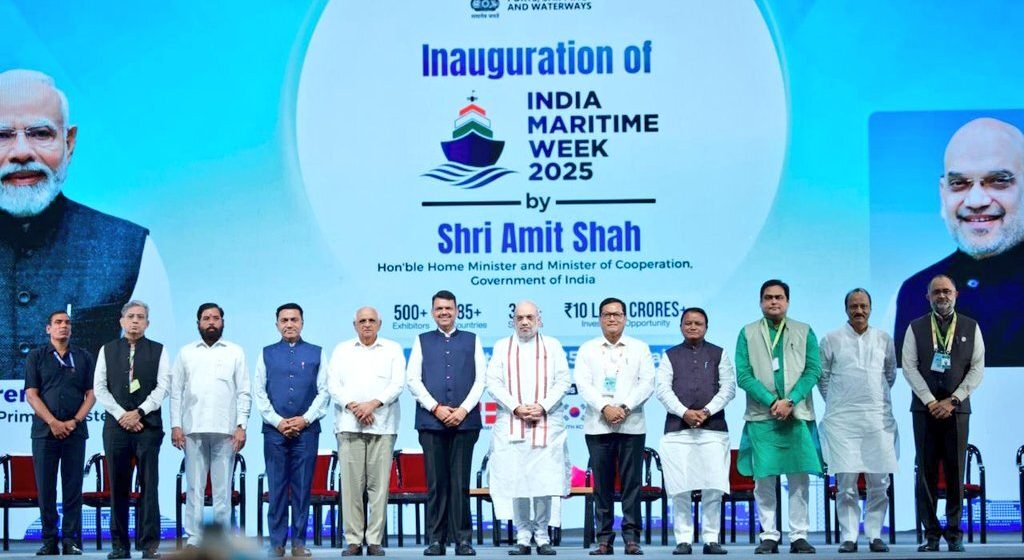The Home Minister said India’s maritime strength lies not in competition but in cooperation, with the goal of building a green maritime future that drives growth while staying in harmony with nature.
India’s emergence on the global maritime map, driven by structural reforms under Prime Minister Narendra Modi’s leadership, has positioned the country as a vital link between the developed and developing world, Union Home and Cooperation Minister Amit Shah said on Monday.
“This is India’s maritime moment—one that is transforming the Gateway of India into the Gateway of the World,” Shah declared while inaugurating India Maritime Week (IMW) 2025 at the NESCO Exhibition Centre in Mumbai. The five-day event is billed as the world’s largest gathering of the global maritime industry.
Shah highlighted India’s strategic location and extensive coastline as key enablers of its maritime rise.
“Our 11,000 km-long coastline, 13 coastal states, and 2.37 million sq km exclusive economic zone make India a natural maritime power. Around 60 per cent of our GDP comes from coastal states, and nearly 800 million people depend on the sea for their livelihood.”
He said the government’s maritime policy is anchored in Prime Minister Modi’s MAHASAGAR vision—Mutual and Holistic Advancement for Security and Growth Across Regions—and aims to position India as a cooperative, green maritime hub.
“India’s maritime strength lies not in competition but in cooperation. Our goal is to build a green maritime future that accelerates growth while maintaining harmony with nature,” Shah added.
Held under the theme ‘Uniting Oceans, One Maritime Vision’, IMW 2025 brings together over 100,000 participants from 85 countries, including 500 exhibitors, 350 speakers, and 12 concurrent conferences and exhibitions. The event showcases India’s maritime resurgence and its ambition to become a global maritime leader by 2047.
Maritime Leadership Endorsed
Union Minister for Ports, Shipping, and Waterways Sarbananda Sonowal described IMW 2025 as “a turning point in India’s maritime journey.” He said the summit reflects the government’s resolve to elevate India among the world’s top maritime powers through policy reform, digital transformation, and record investment.
“India currently handles about 10 per cent of global seaborne trade. Our goal is to triple this by 2047, supported by a fourfold increase in port capacity and the development of deep-draft mega ports,” Sonowal said.
He noted that India’s port capacity has nearly doubled to 2,700 million tonnes per annum (MTPA), cargo handled has risen to 1,640 million metric tonnes (MMT), and inland waterways cargo has grown from 6.9 MMT to over 145 MMT in the last decade. The number of Indian seafarers has surged by 200 percent, reaching 320,000.
“India Maritime Week 2025 is a global vote of confidence. With 85 countries represented and ₹10 trillion in investment commitments, the world is recognising India as the next big force in maritime leadership,” Sonowal said.
Minister of State Shantanu Thakur emphasised India’s focus on sustainability, innovation, and human resource development.
“India is building a smart, sustainable, and globally competitive maritime ecosystem that empowers industry, protects the environment, and connects Bharat to the world.”
The inaugural day featured ministerial plenaries, bilateral meetings, and state-led sessions focused on innovation, sustainability, and investment. Bilateral sessions with Sri Lanka, the Netherlands, and Saudi Arabia explored collaboration in shipbuilding, green ports, and maritime logistics.
IMW 2025 will host over 100 thematic sessions, CEO roundtables, and ministerial dialogues through October 31.


